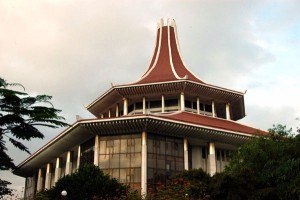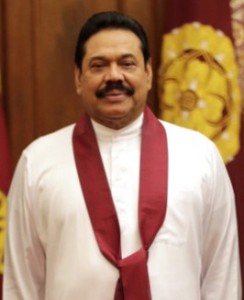by William Crawley and David Page, ICWS Senior Research Fellows
The articles in our edited volume Embattled Media were written before the Presidential election in Sri Lanka in which President Mahinda Rajapaksa was defeated and removed from office. For some of our authors and readers, instead dating the book, this has transformed its interest and potential influence. Our contributors write about aspects of the Sri Lankan media environment which have caused major difficulties in the past but now – in today’s changed political circumstances – are prompting creative and constructive thinking. The reality with Sri Lanka is that more than forty years of conflict and insurgency and civil war have given rise to a generation which has lost any experience of normality in the legal system, and the environment in which Sri Lanka’s long established and sophisticated media operate. The challenge today is to restore that normality.

“Supreme Court Colombo” by Mystìc at the English language Wikipedia. Licensed under CC BY-SA 3.0 via Commons
One of the first issues to be tackled by the new government is discussed by several of the authors in Embattled Media – a Bill to ensure a Right to Information. The legal limitations of Sri Lanka’s constitutional protection of a freedom of speech are analysed in in some detail by Jayantha de Almeida Guneratne. The Supreme Court had ruled that media freedoms could be superseded by Emergency regulations which had been in force for much of the past forty years. He argues that a Right to Information Act is therefore an urgent necessity. But it has not been easy to press forward. A draft Right to information Act was presented by the government to parliament but stalled under parliamentary pressure. The new parliament elected in August has another opportunity to address the issue. The external factor of the presentation last month to the UN Human Rights Council of the report on wartime excesses has added to internal pressures at home for new initiatives.
At the seminar on 20 October Kishali Pinto Jayawardena, co-editor of Embattled Media, was in a position to analyse how attitudes and possibilities for Media Reform have changed in the 10 months since the Rajapaksa government was ousted. But Sri Lanka’s long tradition of judicial and constitutional independence, shorn of its Emergency accretions, is very much part of an inheritance shared by India and other countries of south Asia. For the Commonwealth and the wider international community, media freedoms have come to be seen as an important part of the human rights agenda. Sri Lanka’s immediate neighbour India has been treated with wariness as a ‘big brother’ whose past intervention in the Sri Lankan conflict ended disastrously for its own long term influence. Yet Indian legal practice and judicial decisions have provided some welcome examples and support for a Sri Lankan civil society seeking to conserve and rebuild its democratic foundations. Lawrence Liang of the Alternative Law Forum based in Bangalore, another speaker at the seminar on 20 October, is a critic of many aspects of the Indian judiciary. He will surely give an interesting view of some of the parallel dilemmas that both India and Sri Lanka have faced in the regulation of the media. The focus on Sri Lanka and south Asia, with which Embattled Media is mainly concerned, is the starting point for the seminar and will form the topic of the first session.

Ousted President Mahinda Rajapaksa. By Estonian Foreign Ministry/Presidential Secretariat of Sri Lanka
But it is the wider global relevance of issues of media regulation, freedom and reform that other speakers will focus on. The Commonwealth as an international institution drew up the Latimer House Principles in 1998 as guidelines for the relations between parliament, the executive and the judiciary in Commonwealth countries, and the three distinguished speakers in the seminar’s second session will reflect on Media Policy and Governance in these countries. Victoria Holdsworth, Head of Media at the Commonwealth Secretariat will speak on the need for an integrated approach to media development. Lawrence McNamara of the Bingham Centre for the Rule of Law, based in London University, will speak on the relevance of the Latimer House principles to media freedom and the accountability of the Executive in Commonwealth countries. Mark Stephens, past present of the Commonwealth Lawyers Association – the body which played a key role in drawing up the Latimer House principles 27 years ago – will also speak.
The protection of journalists has become an increasingly urgent issue as the number of journalists killed and injured in the exercise of their profession has steadily increased, especially in areas of conflict. Sri Lanka became a prime example of this as journalists of all ethnic groups were exposed to violence and targeted assassinations from both state and non-state actors in the prolonged civil war. As Amal Jayasinghe writes in his contribution to Embattled Media, his employers Agence France Presse at a critical stage in the Sri Lanka conflict sent him – for his own safety – to Afghanistan! The third session will focus on the urgent and vital question of how to make safeguards for journalists more effective, with contributions from Oliver Spencer of Article19, the Indian journalist and documentary film maker Nupur Basu, Judith Townend of the Institute of Advanced Legal Studies at the School of Advanced Study, University of London, and William Horsley, Director of the Centre for the Freedom of the Media in Sheffield University.
We asked contributors to Embattled Media to look at the state of media education in Sri Lanka. One of the purposes of the book has been to provide documentation and study material for a more informed academic study of the media in Sri Lankan universities. For the seminar’s final session our speakers include Daya Thussu, Professor of Communications and Director of the Indian Media Centre at Westminster University, Nicole Stremlau of the Oxford Programme on Comparative Media Law and Policy, Tessa MacArthur of the Department of International Development – speaking on DFID policy on governance and the media – and James Deane, Director of Policy and Research at BBC Media Action. This discussion to be chaired by Professor James Manor promises to be lively and illuminating not only for students of south Asia but for those involved with assessing the impact of rapidly changing media technologies. It will also look at priorities for those engaged in supporting and delivering programmes to strengthen the role of the media as a key element of the governance process in democratic countries.

Recent Comments